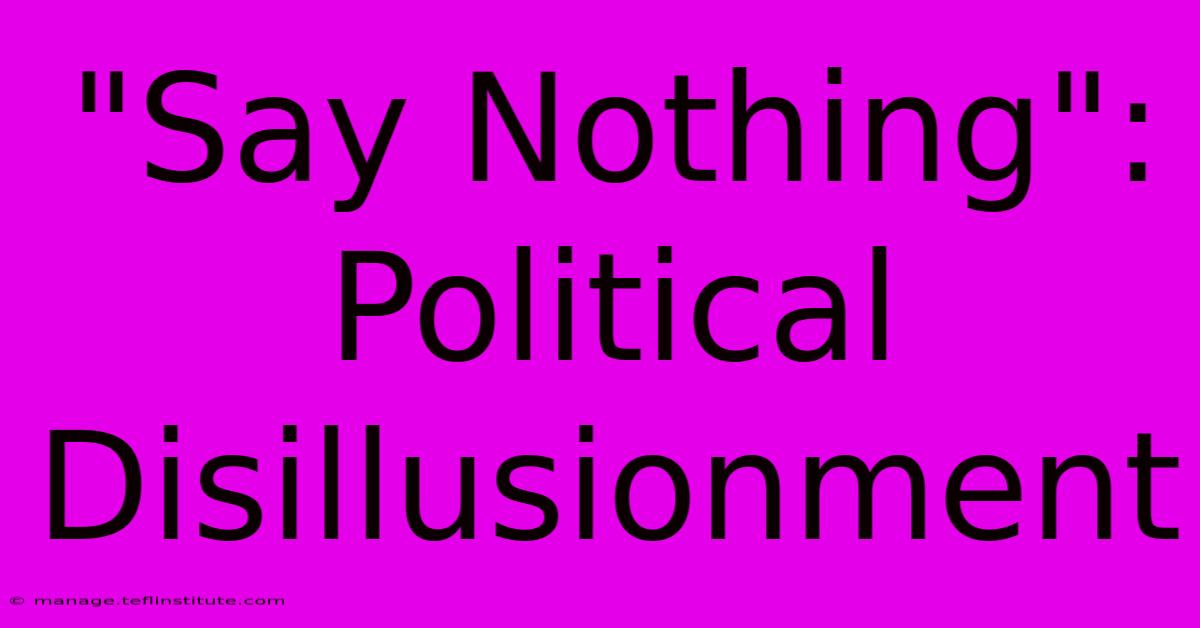"Say Nothing": Political Disillusionment

Table of Contents
Say Nothing: A Nation's Silence and the Crushing Weight of Political Disillusionment
Patrick Radden Keefe's "Say Nothing: A True Story of Murder and Memory in Northern Ireland" is more than a gripping account of a brutal assassination and the subsequent decades-long investigation. It's a powerful exploration of political disillusionment, demonstrating how decades of violence and unresolved conflict can erode trust, fracture communities, and leave a legacy of silence that suffocates truth and justice. The book, focusing on the 1972 abduction and murder of Jean McConville by the Provisional IRA, reveals the pervasive impact of political disillusionment on individuals and the collective psyche of Northern Ireland.
The narrative effectively highlights how deeply ingrained political divisions led to a climate of fear and mistrust. McConville, a widowed mother of ten, was targeted not for any act of violence, but for the suspicion of being an informer – a suspicion fueled by the pervasive atmosphere of paranoia and the intense propaganda wars waged by both sides of the conflict. Her fate highlights the chilling consequences of a society fractured along political lines, where suspicion overrides empathy and accusations, however unfounded, can lead to brutal consequences. This underscores a crucial element of political disillusionment: the erosion of faith in institutions and the systems designed to protect citizens. The IRA, acting as a shadow government in many ways, operated outside the law, highlighting a failure of the state to provide security and justice.
Furthermore, "Say Nothing" unveils the debilitating effect of political disillusionment on individual agency. Many individuals, caught in the crossfire, chose silence – not necessarily out of complicity, but out of a rational calculation to protect themselves and their families. The fear of reprisal, coupled with a lack of faith in the impartiality of the legal system, created a culture of silence that allowed perpetrators to escape justice for decades. This chilling reality underscores how political disillusionment can strip citizens of their power, leaving them feeling helpless and vulnerable within their own communities. The book demonstrates how this prolonged silence became a self-perpetuating cycle, obstructing the path to healing and reconciliation.
The story also touches upon the broader political disillusionment stemming from the perceived failures of both the British government and the Irish Republican movement. The British army's actions, often heavy-handed and perceived as biased, fueled resentment and anger among the nationalist population, while the IRA's brutality and disregard for human life alienated many who initially supported their cause. This disillusionment created a moral vacuum, where the lines between right and wrong blurred, further contributing to the culture of violence and impunity.
Keefe’s meticulous research and insightful narrative demonstrate how political disillusionment is not merely an abstract concept, but a tangible force with devastating real-world consequences. The lasting impact of the Troubles in Northern Ireland, as portrayed in "Say Nothing," serves as a cautionary tale about the dangers of unchecked violence, political polarization, and the corrosive effects of sustained conflict on a society's ability to pursue truth, justice, and reconciliation. The book ultimately serves as a powerful reminder that the fight for truth and accountability, even in the face of overwhelming political disillusionment, remains crucial for healing and building a more just and peaceful future.

Thank you for visiting our website wich cover about "Say Nothing": Political Disillusionment. We hope the information provided has been useful to you. Feel free to contact us if you have any questions or need further assistance. See you next time and dont miss to bookmark.
Featured Posts
-
Erivo Reveals Wicked Audition Details
Nov 15, 2024
-
Carsley Shines In Englands Win Over Greece
Nov 15, 2024
-
Glastonbury Tickets Get Yours Today Dont Miss Out
Nov 15, 2024
-
New Asos Lawsuit Filed
Nov 15, 2024
Latest Posts
-
F1 Unlocked Join F1 75 Live
Nov 15, 2024
-
F1 75 Live Your Chance To Join
Nov 15, 2024
-
Pitbull Dublin Concert Pre Sale Access
Nov 15, 2024
-
How To Get Pitbull Dublin Pre Sale Tickets
Nov 15, 2024
-
Join F1 75 Live With F1 Unlocked
Nov 15, 2024
-
Pitbull Dublin Pre Sale Dont Miss Out
Nov 15, 2024
